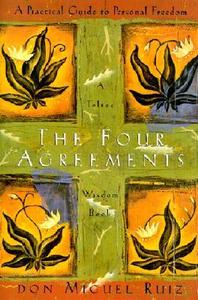
Ruiz presents the Toltec belief system around suffering and happiness in the world. It argues that from the moment we are born, we begin making agreements with other people whether we actually want to or not. Our language is one of the first agreements: We have to share belief in the definitions of words in order to communicate. We have to agree on social behaviors in order for society to function. However, not all of the agreements we sign up for are healthy. These are the agreements we make that shatter our self-esteem and our happiness. They are the ones that teach us to judge ourselves and others harshly.
In order to break away from those beliefs, Ruiz presents four agreements which he argues will change one’s life if one is able to follow them. The four agreements are:
1. Be impeccable with your word.
2. Don't take anything personally.
3. Don't make assumptions.
4. Always do your best.
By being impeccable with one’s word, Ruiz is not just asking us to be truthful or to avoid lies. Instead, Ruiz believes that our words create our entire world. They are how we manifest positivity and negativity. By being impeccable with our word, one will be able to “take responsibility for your actions, but you do not judge or blame yourself” (31). Being impeccable means that we no longer call others derogatory terms because those words only reflect on who we are: We will express ourselves in love instead of hate. This is a challenge for most of us because the world we live in promotes both gossip against others and self-hatred.
Not taking anything personally is a clear idea though one that is hard to put into practice for many. When someone yells at us, we judge ourselves and believe we have done something wrong. Instead, we should believe that they are yelling at us because of their issues and their upbringing. The way they treat us reflects more on them than us. Thus, we should not take their actions personally. This agreement can help heal old wounds by helping us to rewrite history under a new lens. By understand that people’s insults are based on their own insecurities, such as someone insecure in their own appearance attacking our appearance, then we can understand that the pain we took on actually belonged to someone else. Enacting this agreement can eliminate a huge amount of suffering that we create for ourselves.
Assumptions are a part of our lives, and unfortunately, they undermine communication and relationships. As Ruiz argues, if we have the confidence to stop making assumptions and to ask questions, our world will change. Even if we are dealing with someone we have known for twenty years, we should never assume that they know what we want. We need to be clear in our desires so that no one has a chance to make faulty assumptions. Likewise, we need to ask others what they need so that we don’t make faulty assumptions either. The saying “to assume just makes an ass out of u and me” holds true in this agreement.
Finally, Ruiz states that we should always do our best, though he is clear that our best will always be changing. On the days we are sick or weak, our best won’t be as strong as it is on our healthy days. That doesn’t mean that we should give anything less than our all, though. However, it also does not mean that we should overdo it. Furthermore, Ruiz believes that once we begin to do our best, we will be happier because we are no longer working for rewards. We are working to do what makes us happy instead.
Ruiz states, “[The four agreements are] so simple and logical that even a child can understand them” (88). He’s right, and that is one of my complaints about this book. It is very simply written in many places. It can also be unnecessarily repetitive. The English teacher in me wanted to pull out a red pen to edit it down; this short pocket book of only 140 pages could have been far less than 100 and still been as successful.
I also found Ruiz’s views a bit narrow at times. His concepts about childhood presume that a child is not raised in an abusive home and that every child is loved and cared for properly. That’s unfortunately not true. Even by the tender age of two, some children have already taken on emotional, spiritual, and physical responsibilities in dysfunctional homes in order to protect themselves. Furthermore, I think that Ruiz’s beliefs that positive visions can create anything are overly idealized. While we can create our own happiness, we cannot visualize anything into being. No matter how hard I try and how much I visualize it, I will never be a six foot tall runway model in this lifetime. However, I can find happiness in my body as it is. I just will have to find another career to enjoy. I also strongly disagree with Ruiz’s perspective on mental illness; I could fill an entire post just on that topic.
Despite the weak editing and its differences in view from my own beliefs, The Four Agreements is a book that has changed many lives and has the potential to change many more. If you are looking to find a way to be happier in your life, especially if you are in a situation that seems impossible, this book could provide the foundation for you to work from. I also think it could provide a great platform for couple’s counseling for partners who find that communication and compatibility have disappeared from their relationship.
© 2015 Green Heart Guidance, LLC
 RSS Feed
RSS Feed